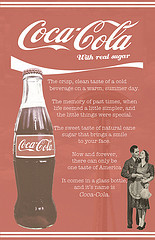Group Calls For Limits On Sugar In Soft Drinks

(БРАТСТВО)
The CSPI uses the American Heart Association’s recommended daily maximum of 6 tsps of added sugar for women and 9 tsps for men to point out that a single 20-ounce bottle of soda typically contains around 16 tsps of sugar, often from high-fructose corn syrup.
Furthermore, argues the group, the average American consumes between 18 and 23 teaspoons (300-400 calories) of added sugars per day. Research shows that around 20% of adolescents (ages 12 to 18) consume at least 25% of their calories from added sugars. In all, around 14 million people in the U.S. consume more than one-third of their calories in the form of added sugars.
“As currently formulated, Coke, Pepsi, and other sugar-based drinks are unsafe for regular human consumption,” said CSPI executive director Michael F. Jacobson. “Like a slow-acting but ruthlessly efficient bioweapon, sugar drinks cause obesity, diabetes, and heart disease. The FDA should require the beverage industry to re-engineer their sugary products over several years, making them safer for people to consume, and less conducive to disease.”
In its regulatory petition [PDF] filed with the FDA, CSPI cites research showing that drinks are the leading source of calories in the American diet and indicating that the added sugars in these drinks has is leading to weight gain, obesity, and chronic diseases like diabetes, heart disease, and gout.
“If one were trying to ensure high rates of obesity, diabetes, or heart disease in a population, one would feed the population large doses of sugary drinks,” says Walter Willett, professor of nutrition and epidemiology at the Harvard School of Public Health, and one of several researchers to add his name to a letter sent to FDA Commissioner Margaret Hamburg. “The evidence is so strong that it is essential that FDA use its authority to make sugary drinks safer.”
The petition and the letter take issue with the FDA’s current classification of added sugars as “generally recognized as safe” (GRAS), which means that the scientific community believes the ingredient is safe at levels normally consumed. According to the petitioners, Americans are now consuming sugars at a rate that is not considered safe. Though it doesn’t suggest a specific number, the petition asks the FDA to set a maximum safe level of added sugars in beverages.
Those who oppose the notion of capping added sugars argue that regulation may not be the best way to fight obesity.
“If we start blaming one component of the diet for something as complicated as obesity, I think that’s a slippery slope,” one cardiologist tells USA Today. “It’s emotionally attractive to blame added sugars for obesity, but if we go in this direction, it will prevent us from looking at the total diet to solve obesity. Even if we made drastic cuts in the amount of added sugars in our diet, I believe people would find other ways of over-consuming calories.”
The American Beverage Association, which has spent a lot of money in recent years advertising the growing range of diet and mid-calorie drink options, says that “Everyone has a role to play in reducing obesity levels — a fact completely ignored in this petition. This is why the beverage industry has worked to increase options and information for consumers. Today about 45% of all non-alcoholic beverages purchased have zero calories and the overall average number of calories per beverage serving is down 23% since 1998.”
Want more consumer news? Visit our parent organization, Consumer Reports, for the latest on scams, recalls, and other consumer issues.

